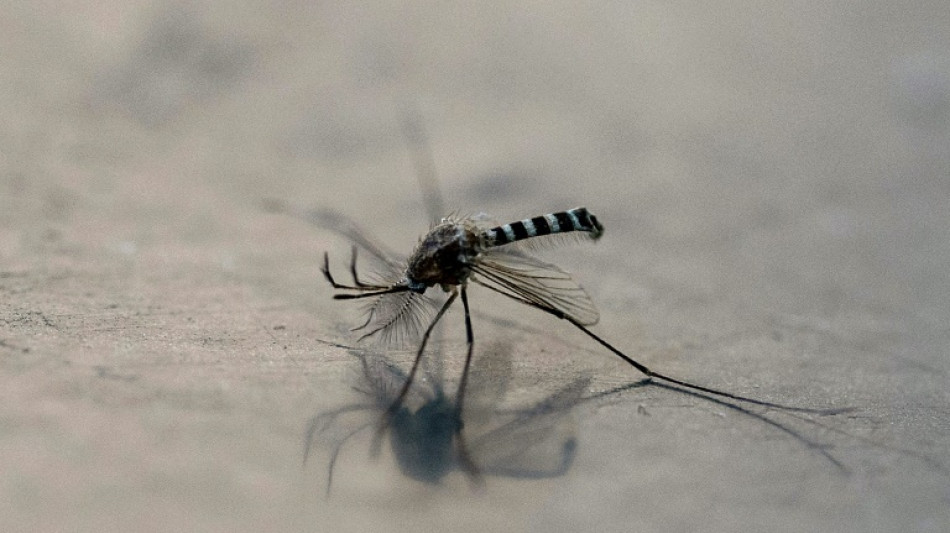
-
 Myanmar junta seeks to prosecute hundreds for election 'disruption'
Myanmar junta seeks to prosecute hundreds for election 'disruption'
-
West Indies hope Christmas comes early in must-win New Zealand Test

-
 Knicks beat Spurs in NBA Cup final to end 52-year trophy drought
Knicks beat Spurs in NBA Cup final to end 52-year trophy drought
-
Khawaja revels in late lifeline as Australia 194-5 in 3rd Ashes Test

-
 Grief and fear as Sydney's Jewish community mourns 'Bondi rabbi'
Grief and fear as Sydney's Jewish community mourns 'Bondi rabbi'
-
Trump orders blockade of 'sanctioned' Venezuela oil tankers

-
 Brazil Senate to debate bill to slash Bolsonaro jail term
Brazil Senate to debate bill to slash Bolsonaro jail term
-
New Zealand ex-top cop avoids jail time for child abuse, bestiality offences

-
 Eurovision facing fractious 2026 as unity unravels
Eurovision facing fractious 2026 as unity unravels
-
'Extremely exciting': the ice cores that could help save glaciers

-
 Asian markets drift as US jobs data fails to boost rate cut hopes
Asian markets drift as US jobs data fails to boost rate cut hopes
-
What we know about Trump's $10 billion BBC lawsuit

-
 Ukraine's lost generation caught in 'eternal lockdown'
Ukraine's lost generation caught in 'eternal lockdown'
-
'Catastrophic mismatch': Safety fears as Jake Paul faces Anthony Joshua

-
 Australia's Steve Smith ruled out of third Ashes Test
Australia's Steve Smith ruled out of third Ashes Test
-
Khawaja grabs lifeline as Australia reach 94-2 in 3rd Ashes Test

-
 Undefeated boxing great Crawford announces retirement
Undefeated boxing great Crawford announces retirement
-
Trump says orders blockade of 'sanctioned' Venezuela oil tankers

-
 UK experiences sunniest year on record
UK experiences sunniest year on record
-
Australia holds first funeral for Bondi Beach attack victims

-
 FIFA announces $60 World Cup tickets after pricing backlash
FIFA announces $60 World Cup tickets after pricing backlash
-
Maresca relishes support of Chelsea fans after difficult week

-
 Nested Knowledge and Pharmacy Podcast Network Announce Strategic Collaboration to Advance Evidence-Based Podcasting in Healthcare
Nested Knowledge and Pharmacy Podcast Network Announce Strategic Collaboration to Advance Evidence-Based Podcasting in Healthcare
-
Players pay tribute to Bondi victims at Ashes Test

-
 Costa Rican president survives second Congress immunity vote
Costa Rican president survives second Congress immunity vote
-
Married couple lauded for effort to thwart Bondi Beach shootings

-
 Australia holds first funerals for Bondi Beach attack victims
Australia holds first funerals for Bondi Beach attack victims
-
Trump has 'alcoholic's personality,' chief of staff says in bombshell interview

-
 Rob Reiner killing: son to be charged with double murder
Rob Reiner killing: son to be charged with double murder
-
Chelsea battle into League Cup semis to ease pressure on Maresca

-
 Netflix boss promises Warner Bros films would still be seen in cinemas
Netflix boss promises Warner Bros films would still be seen in cinemas
-
Grok spews misinformation about deadly Australia shooting

-
 Stocks mostly retreat on US jobs, oil drops on Ukraine hopes
Stocks mostly retreat on US jobs, oil drops on Ukraine hopes
-
Artificial snow woes for Milan-Cortina Winter Olympics organisers

-
 Trump imposes full travel bans on seven more countries, Palestinians
Trump imposes full travel bans on seven more countries, Palestinians
-
New Chile leader calls for end to Maduro 'dictatorship'

-
 Shiffrin extends slalom domination with Courchevel win
Shiffrin extends slalom domination with Courchevel win
-
Doctor sentenced for supplying ketamine to 'Friends' star Perry

-
 Tepid 2026 outlook dents Pfizer shares
Tepid 2026 outlook dents Pfizer shares
-
Rob Reiner murder: son not medically cleared for court

-
 FIFA announces $60 World Cup tickets for 'loyal fans'
FIFA announces $60 World Cup tickets for 'loyal fans'
-
Dembele and Bonmati scoop FIFA Best awards

-
 Shiffrin dominates first run in Courchevel slalom
Shiffrin dominates first run in Courchevel slalom
-
EU weakens 2035 combustion-engine ban to boost car industry

-
 Arctic sees unprecedented heat as climate impacts cascade
Arctic sees unprecedented heat as climate impacts cascade
-
French lawmakers adopt social security budget, suspend pension reform

-
 Afrikaners mark pilgrimage day, resonating with their US backers
Afrikaners mark pilgrimage day, resonating with their US backers
-
Lawmakers grill Trump officials on US alleged drug boat strikes

-
 Hamraoui loses case against PSG over lack of support after attack
Hamraoui loses case against PSG over lack of support after attack
-
Trump - a year of ruling by executive order


Mosquitoes with 'toxic' semen could stem disease spread: research
Genetically engineered mosquitoes with toxic semen could be a new weapon against tropical disease, Australian scientists said after trialling the novel pest control method.
The "toxic male technique" aims to breed mosquitoes that express venomous proteins in their semen, killing off females after mating.
Female mosquitoes are targeted because only they bite and drink blood, thereby spreading diseases such as malaria and dengue fever.
Scientist Sam Beach from Australia's Macquarie University said the method "could work as quickly as pesticides without also harming beneficial species".
"This innovative solution could transform how we manage pests, offering hope for healthier communities and a more sustainable future."
The first proof-of-concept trials used fruit flies, a common laboratory species favoured for its short two-week life cycle.
Female flies that bred with "toxic" males had a significantly reduced lifespan, the scientists found.
Researcher Maciej Maselko said the team would now trial the method in mosquitoes.
"We still need to implement it in mosquitoes and conduct rigorous safety testing to ensure there are no risks to humans or other non-target species," he said.
Genetic engineering has been used for years to control populations of disease-spreading mosquitoes.
Typically, these approaches slow reproduction by releasing hordes of male insects that are genetically modified to be sterile.
Computer models showed techniques actively killing biting females could be far more effective, the research team said.
The research was described in a paper published by peer-reviewed journal Nature Communications on Tuesday evening.
B.Torres--AT




